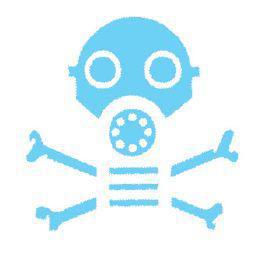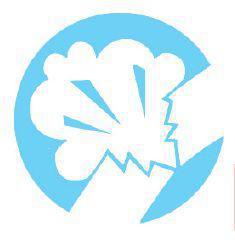SAS Urban Survival Handbook (14 page)
Read SAS Urban Survival Handbook Online
Authors: John Wiseman
Tags: #Health & Fitness, #Reference, #Survival, #Fiction, #Safety, #Self-Help, #Personal & Practical Guides, #General, #Survival Skills

Rechargeable batteries
There are so many portable, expensive-to-run, battery-operated devices on the market—especially personal stereos—that rechargeable ‘NiCad’ (nickel cadmium) batteries are becoming very common. These batteries do NOT last forever and overcharging can be dangerous. Always follow instructions.
GAS
 Gas is a relatively cheap, clean fuel for cooking and domestic heating. Whether produced as a product of the coal industry (coal gas), ‘natural gas’, or in cylinders (propane and butane), it is extremely DANGEROUS—and should never be taken for granted. Coal gas is highly poisonous—fatal cases of asphyxiation are very common. Some ‘natural’ gas, such as North Sea gas, is a lot less poisonous, but will still make you very ill in sufficient concentration. Both are EXPLOSIVE—the tiniest spark could trigger a devastating explosion.
Gas is a relatively cheap, clean fuel for cooking and domestic heating. Whether produced as a product of the coal industry (coal gas), ‘natural gas’, or in cylinders (propane and butane), it is extremely DANGEROUS—and should never be taken for granted. Coal gas is highly poisonous—fatal cases of asphyxiation are very common. Some ‘natural’ gas, such as North Sea gas, is a lot less poisonous, but will still make you very ill in sufficient concentration. Both are EXPLOSIVE—the tiniest spark could trigger a devastating explosion.
The supply
The gas enters your premises via the service pipe, which ends with an isolating (on/off) valve, just before the meter. This valve is operated by turning the spanner-like handle. It should move without too much effort—but it shouldn’t be loose either. If you have any concerns about it, if you doubt you have the strength to turn it on and off, call the gas company and ask them to send someone to sort it out.
Pipes from the meter carry the gas around your home to each appliance. Each appliance will probably be connected by a fixed coupling, with or without an on/off key—in some cases to an outlet point, with its own on/off key. It is usual for a flexible hose to be joined onto one of these—the commonest being a gas cooker. The flexible hose allows the cooker to be eased forward for cleaning without disrupting the supply.
All internal gas plumbing is made of copper, these days. If you find any pipes which appear to be lead composition or iron, they are likely to be rather old. Get them checked!

WARNING
Do NOT tackle even the simplest of gas installations or maintenance jobs yourself! Gas plumbing is a job for experts only. Any problem with gas supplies or appliances should be reported immediately.
VENTILATION
 To burn safely, all gas appliances MUST have a supply of fresh air. This may be supplied by normal room ventilation or through a balanced flue, a system which draws air directly into the apparatus from outside the house and discharges fumes directly out again. This is also called a ‘room-sealed’ system.
To burn safely, all gas appliances MUST have a supply of fresh air. This may be supplied by normal room ventilation or through a balanced flue, a system which draws air directly into the apparatus from outside the house and discharges fumes directly out again. This is also called a ‘room-sealed’ system.
Never obstruct airbricks or attempt to seal off all draughts in a room where gas equipment is used. Beware double glazing!
Failure to ventilate could lead to the appliance using up all the available oxygen, possibly causing unconsciousness and subsequent suffocation. It also increases greatly the risk of a build-up of carbon monoxide—a very poisonous gas which has no smell. You are only likely to be aware of it when you begin to be subjected to its poisoning effects.
NEVER cover or lean anything against the external vent of a balanced flue. Obstructing the air flow could cause inefficient burning and the production of poisonous fumes.
Gas appliances MUST be checked and serviced annually. Blocked jets and the accumulation of deposits may make the apparatus dangerous as well as inefficient.
All gas burners give off carbon dioxide and water vapour. With permanent appliances these are taken away by the flue or chimney, but a fault may sometimes discharge them into the room. Unvented appliances may cause severe condensation problems if room ventilation is poor.
Carbon monoxide
Explosions caused by leaking gas are frighteningly common, but four times as many people die from carbon monoxide poisoning. Unburnt gas does not contain carbon monoxide—but it is produced if a gas appliance is not burning efficiently.
You cannot smell carbon monoxide, but breathing it for even fairly brief periods of time can be FATAL. Coal gas produces higher concentrations of carbon monoxide than ‘natural’ gas. If gas appliances are installed by a professional and regularly serviced (once a year)—and ventilation is adequate—the risk is minimized. Most cases of carbon monoxide poisoning involve gas appliances with blocked flues or chimneys, or dangerous old gas water heaters in bathrooms.
Avoid cheap gas equipment from non-specialist dealers and only buy secondhand equipment if you are willing to pay someone to completely overhaul it to make sure it is safe.
Carbon monoxide is also produced by exhaust fumes from vehicles, oil burners, wood/coal/charcoal fires and bonfires. Always ensure adequate ventilation. NEVER run the engine of a vehicle in a sealed garage!
Look for the danger signs
A yellow/orange flame
indicates inefficient burning of the gas.
Stains/soot/discolouration
around the appliance may indicate that exhaust gases are leaking into the room.
A slightly gassy smell
of burning may also indicate the presence of exhaust gases.

SAVE A LIFE!
CARBON MONOXIDE
- ►
SYMPTOMSUnexplained headaches, sickness, chronic tiredness, muscular weakness. Could be confused with influenza—but associated often with one room or part of a home. Casualty may be semi-conscious or unconscious in a ‘stuffy’ room
- ►
INDICATIONSGas burning with a yellow orange flame Staining/soot/discolouration around appliance
Room very smoky from open fire/Car engine running in confined space
You must act quickly. If someone else is with you, they should call an ambulance while you apply first aid.
GET VICTIM TO FRESH AIR
Outdoors or by a large open window
LOOSEN RESTRICTIVE CLOTHING
Around the neck and chest
IS VICTIM BREATHING? IS HEART BEATING?
If not, apply artificial respiration and/or cardiac compression
WHEN BREATHING AND HEARTBEAT ARE OK
Place victim in recovery position
REMEMBER
- ■
If the victim feels ‘better’, you must still seek medical help - ■
The appliance must NOT be used again until it has been checked - ■
The chimney/flue may have been blocked

EMERGENCY! GAS LEAK
If you smell gas …
If you suspect a leak …
IMMEDIATELY:
1
Extinguish cigarettes and any naked flames
2
Do NOT operate light switches, doorbells, telephones or any other electrical apparatus or open fridges/freezers. Switches cause a spark which could ignite the gas
3
Open doors and windows to dispel gas
4
Check! You may have left a burner unlit. A low burner or pilot light may have blown out
5
Turn off the supply at the meter
6
Call the gas emergency service—but NOT from a gas-filled room
7
Evacuate to a safe distance until help arrives
Gas safety rules
- ◑ All gas installations and maintenance MUST be done by experts—NEVER attempt to do any of the work yourself.
- ◑ NEVER use, or allow to be used, an appliance which is known to be or suspected to be faulty in any way.
- ◑ If you suspect a leak, turn off the supply at the meter and inform the gas company.
- ◑ Gas must have a ready supply of air to burn efficiently. NEVER seal off all ventilation to a room.
- ◑ NEVER fool around with gas. NEVER!
REMEMBER
Water is likely to damage your property when pipes leak or installation work is shoddy—but leaks are visible and easily sorted out. Gas leaks can kill you, even before you have detected any problem.
Old gas water heaters
Old gas water heaters which do not have a ‘balanced’ flue or ‘room-sealed’ flue (which takes its air supply and discharges its exhaust through the wall) are EXTREMELY DANGEROUS. In some countries, such as Britain, it is now illegal to instal them. It may seem to work well but—
IF
there is inadequate ventilation,
IF
the appliance is not serviced at least every six months,
IF
the flue is leaky, damaged or blocked—
THIS TYPE OF APPLIANCE CAN KILL.